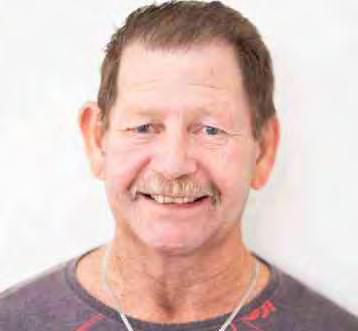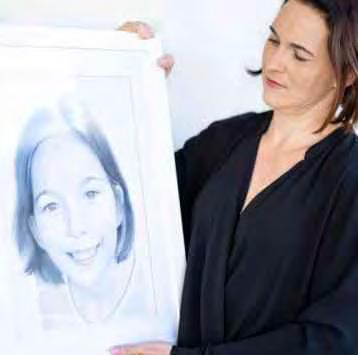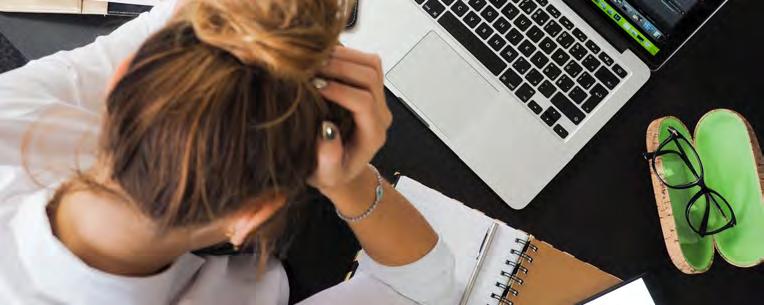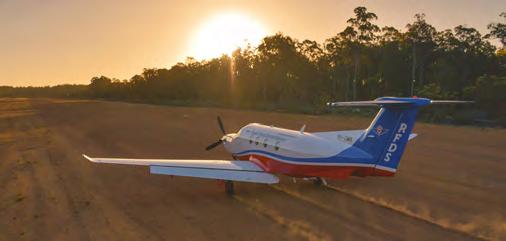
6 minute read
HEALTH
Register as an organ donor this DonateLife Week
Marina Trajkovich
Advertisement
DONATELIFE, the national body for organ donation, is running The Great Registration Race this Donate Life week, encouraging people all over Australia to register as organ donors, a decision that could one day save somebody’s life.
DonateLife week runs from Sunday, July 25 to August 1, a public initiative by the Australian Government’s Organ and Tissue Authority, designed to raise awareness of organ and tissue donation in the country.
With many Australians desperately seeking organ transplants and the number of organ donation surgeries dwindling in 2020 due to COVID-19, DonateLife purports that signing up as a donor is this year more important than ever.
“There are around 13 million Australians aged 16 plus who are eligible to register as an organ and tissue donor but haven’t,” said a representative from Donate Life.
“For ‘The Great Registration Race for DonateLife Week’, our goal is to encourage up to 100,000 more Australians to join the Australian Organ Donor Register.”
Between 2020 and 2019, there was a 16% decrease in the number of donors and a 12% decrease in the number of people receiving a transplant, with 16% fewer people registering as donors last year.
Around 1,800 Australians are on the waiting list for potentially life-saving organ transplants, with a further 12,000 people on daily dialysis who would benefit from a kidney transplant.
Last year, 1,270 Australian lives were saved through an organ transplant due to the generosity of 463 deceased organ donors and their families.
The DonateLife representative said that while the window of eligibility for organ donation is slim, with people needing to have died in hospital, usually on a ventilator or in intensive care with functioning organs, the implications for organ recipients are enormous.
“Very few people have the chance to be an organ donor – only about 2% of people who die in hospital.
“However, many more people can be eye and tissue donors, as donation is possible in more situations, including up to 24 hours after death,” said the representative.
DonateLife data says that while 9 in 10 Aussies support donation, only one in 3 is registered to donate their organs if they die.

Colin – heart recipient, QLD
A once healthy, fit tradie, Colin’s world turned upside down when he ended up on the heart transplant waitlist after a ventricular cardiomyopathy diagnosis and multiple cardiac arrests nearly killed him.
“It got to the point where I had to watch people doing the simplest of tasks for me, and I struggled to walk 30 metres without a break. Stairs were a terrifying plight,” Colin said.
“I will never forget the moment I received the news I was to receive a new heart.
“The night before I was to leave the hospital, I had my guardian angel, my heart transplant coordinator, come and tell me I was getting a new heart!
“After a hug and a cry, I got prepared to meet Kong,

Lifeline Australia invites locals to Stress Down for suicide prevention
Marina Trajkovich
THIS Friday, July 23 is Stress Down Day, Lifeline Australia’s annual initiative designed to raise awareness of stress in the workplace, raising money to support Lifeline’s suicide prevention hotline.
The awareness day invites employers and the public to host their own ‘Stress Down Day,’ by wearing casual dress to work, in exchange for a donation to Lifeline Australia.’
Locals are encouraged to fundraise in any way they can, or to simply make a donation to Lifeline while taking some time for themselves to wind down.
Suggestions made by Lifeline to support the cause include a fundraising barbecue, organising a yoga or meditation class, an office morning tea, sharing posts about Stress Down Day on social media or printing posters in support of the cause in your local cafe.
Luke Lindsay, Lifeline Queensland General Manager says that the campaign is designed to spread awareness on the impacts of stress, encouraging people to check in on themselves.
“Stress is a very real emotion, which can have physical implications that can affect people differently,” said Lindsay.
“What’s important when dealing with feeling stressed or when experiencing stressful situations, is recognising how you are feeling, and acknowledging it’s ok to not be ok. Often people think ‘I should be coping.”
He says that feelings of stress can have a creepingly negative impact on a person’s life and that it’s important to practise self-compassion or to seek help if needed.
“Check-in with yourself, by looking at how you are sleeping, how you are eating, what is your routine and what can you do today and tomorrow to take a moment to slow down and give yourself some space to deal with your mental wellbeing.”
“You can reach Lifeline crisis support through the hotline for a compassionate, non-judgmental person to speak to whenever you need.” my affectionate name for my donor heart.”
Colin and his wife Cheryl now love to caravan all around the countryside, spreading the organ donation message at every caravan stop. He said he is incredibly grateful to his donor and their family.
Sophie, donor, QLD
When 10-year-old Sophie grew her angel wings in 2016, her family didn’t have to think too long about giving the gift of life to others. Her mum Karina said it took about 30 seconds for them to decide.
“Of course, we would donate. Sophie always wanted to help people!” she said.
In fact, the last words young Sophie wrote on her whiteboard in her bedroom were “live life peacefully.”
“She had a beautiful spirit and caring nature, so we knew this was something she would want to do,” Karina said.
“Knowing Sophie’s generous donation has enabled many people to live a fulfilling life warms my heart.”
Kkarina remembers Sophie as a beautiful spirit with a caring nature
Donor recipient Colin Manderson
CONNECT NOW:
Anyone who is over 16 can register as an organ donor. To register, you just need to enter your details with your medicare number at donatelife.gov.au/register.
RFDS crews deliver COVID-19 vaccine to remote and rural communities
Marina Trajkovich
ROYAL Flying Doctor Service primary health care staff have now delivered more than 1,200 doses of the COVID-19 vaccine to rural and remote communities.
The RFDS is working closely in collaboration with Commonwealth and State departments to support the roll-out of the vaccination program to rural and remote Queenslanders who choose to have the vaccine.
RFDS crews from Charleville, Mount Isa and Cairns have supported the delivery of the COVID-19 vaccine to 22 remote communities across Queensland, including nearby Ravenswood. This has included the delivery of both first and second doses.
RFDS’ Queensland Section, Chief Executive Officer Meredith Staib said the Flying Doctor was a trusted provider of primary health care services.
“In addition to the aeromedical retrieval of the critically-ill or injured, the RFDS also delivers regular primary health care clinics, which enable our staff to develop a close rapport with people living and working in rural and remote Queensland,” she said.
“We are pleased to assist the Hospital and Health Services and Primary Health Networks in facilitating access to the COVID-19 vaccine for remote and rural Queenslanders.”
Despite the challenging circumstances of the past year, Ms Staib said the RFDS continued to provide vital emergency medical and primary health care services for regional, rural and remote Queenslanders.
“The RFDS in Queensland has transported 40 patients with COVID precautions. Across Australia, the RFDS has conducted more than 3,050 episodes of care for confirmed or suspected COVID-19 patients,” she said.
“Several procedures have been adjusted, including increases to decontamination procedures for aircraft and pre-screening at our primary health care clinics.
“The protection of our remote communities was, and continues to be, a particular focus. All RFDS staff now undergo a wellness check before flying or beginning their work shift.”
Ms Staib said the RFDS remained unwavering in its mission to deliver the finest care to the furthest corner of the state.
“For more than 93 years the RFDS has helped rural and remote Queenslanders overcome the tyranny of distance to access healthcare services. The RFDS in Queensland is incredibly well-positioned to now assist in the delivery of the COVID-19 vaccination program.”







